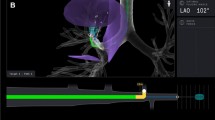Abstract
This paper analyses the factors associated with successful radiofrequency ablation (RFA) of lung metastases. The study group comprised 37 patients [19 female, mean age 61 (34–83)] with 72 metastases who had follow-up CT scans available for analysis and for those with no recurrence >6 months follow-up. Internally cooled electrodes were used in 64 and expandable electrodes in 8. The tumour size and location, electrode type, number of ablations, duration of ablation, year of treatment and tumour contact with vessels larger than 3 mm were recorded. The mean tumour diameter was 1.8 cm (0.4–6.6 cm). Mean follow-up in those without recurrence was 13.1 months (6–48). Recurrence was common in larger tumours, occurring in 7/7 (100%) tumours >3.5 cm compared with 18/65 (28%) ≤ 3.5 cm (P < 0.01). Recurrence occurred in 14/24 (58%) tumours in direct contact with large vessels compared with 11/48 (23%) of the remainder (P = 0.04). On multivariate analysis, size was the dominant feature (P = 0.013); vessel contact and peripheral location did not reach significance (P = 0.056 and 0.054 respectively). Peripheral tumours less than 3.5 cm with no large vessel contact are the optimal tumours for RFA.




Similar content being viewed by others
References
Steinke K, Sewell PE, Dupuy D, Lencioni R, Helmberger T, Kee ST et al (2004) Pulmonary radiofrequency ablation–an international study survey. Anticancer Res 24(1):339–343
Akeboshi M, Yamakado K, Nakatsuka A, Hataji O, Taguchi O, Takao M et al (2004) Percutaneous radiofrequency ablation of lung neoplasms: initial therapeutic response. J Vasc Interv Radiol 15(5):463–470
Lee JM, Jin GY, Goldberg SN, Lee YC, Chung GH, Han YM et al (2004) Percutaneous radiofrequency ablation for inoperable non-small cell lung cancer and metastases: preliminary report. Radiology 230(1):125–134
Yan TD, King J, Sjarif A, Glenn D, Steinke K, Morris DL (2006) Percutaneous radiofrequency ablation of pulmonary metastases from colorectal carcinoma: prognostic determinants for survival. Ann Surg Oncol 13(11):1529–1537
Yamakado K, Hase S, Matsuoka T, Tanigawa N, Nakatsuka A, Takaki H et al (2007) Radiofrequency ablation for the treatment of unresectable lung metastases in patients with colorectal cancer: a multicenter study in Japan. J Vasc Interv Radiol 18(3):393–398
Inoue Y, Miki C, Hiro J, Ojima E, Yamakado K, Takeda K et al (2005) Improved survival using multi-modality therapy in patients with lung metastases from colorectal cancer: a preliminary study. Oncol Rep 14(6):1571–1576
Gadaleta C, Mattioli V, Colucci G, Cramarossa A, Lorusso V, Canniello E et al (2004) Radiofrequency ablation of 40 lung neoplasms: preliminary results. AJR Am J Roentgenol 183(2):361–368
King J, Glenn D, Clark W, Zhao J, Steinke K, Clingan P et al (2004) Percutaneous radiofrequency ablation of pulmonary metastases in patients with colorectal cancer. Br J Surg 91(2):217–223
Yasui K, Kanazawa S, Sano Y, Fujiwara T, Kagawa S, Mimura H et al (2004) Thoracic tumors treated with CT-guided radiofrequency ablation: initial experience. Radiology 231(3):850–857
Simon CJ, Dupuy DE, DiPetrillo TA, Safran HP, Grieco CA, Ng T et al (2007) Pulmonary radiofrequency ablation: long-term safety and efficacy in 153 patients. Radiology 243(1):268–275
de Baere T, Palussiere J, Auperin A, Hakime A, Abdel-Rehim M, Kind M et al (2006) Midterm local efficacy and survival after radiofrequency ablation of lung tumors with minimum follow-up of 1 year: prospective evaluation. Radiology 240(2):587–596
Hiraki T, Sakurai J, Tsuda T, Gobara H, Sano Y, Mukai T et al (2006) Risk factors for local progression after percutaneous radiofrequency ablation of lung tumors: evaluation based on a preliminary review of 342 tumors. Cancer 107(12):2873–2880
Kang S, Luo R, Liao W, Wu H, Zhang X, Meng Y (2004) Single group study to evaluate the feasibility and complications of radiofrequency ablation and usefulness of post treatment position emission tomography in lung tumours. World J Surg Oncol 2(1):30
Belfiore G, Moggio G, Tedeschi E, Greco M, Cioffi R, Cincotti F et al (2004) CT-guided radiofrequency ablation: a potential complementary therapy for patients with unresectable primary lung cancer–a preliminary report of 33 patients. AJR Am J Roentgenol 183(4):1003–1011
Kelekis AD, Thanos L, Mylona S, Ptohis N, Malagari K, Nikita A et al (2006) Percutaneous radiofrequency ablation of lung tumors with expandable needle electrodes: current status. Eur Radiol 16(11):2471–2482
Author information
Authors and Affiliations
Corresponding author
Rights and permissions
About this article
Cite this article
Gillams, A.R., Lees, W.R. Radiofrequency ablation of lung metastases: factors influencing success. Eur Radiol 18, 672–677 (2008). https://doi.org/10.1007/s00330-007-0811-y
Received:
Revised:
Accepted:
Published:
Issue Date:
DOI: https://doi.org/10.1007/s00330-007-0811-y




